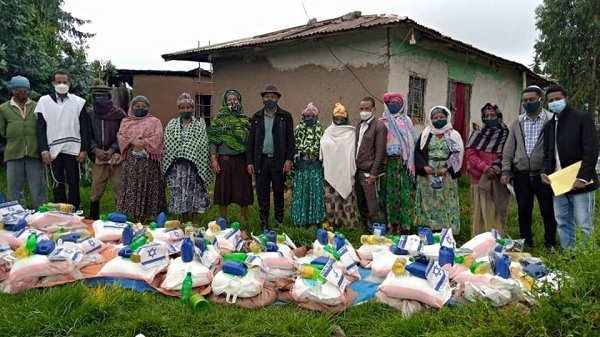
MASHAV, Israel’s agency for international development cooperation, provided urgent humanitarian aid to the Beta Israel community in Ethiopia.
The community, located in the city of Debre Birhan in central Ethiopia (Amhara Region) have suffered from a severe shortage of basic food products due to the ongoing coronavirus crisis. Ethiopian authorities have so far declared 15,200 cases of coronavirus in the country.
The aid, which was organized in conjunction with the Israeli Embassy in Ethiopia, included food packages and hygiene products given to 100 families.
Another shipment of humanitarian aid to other communities in need is planned soon, according to the Foreign Ministry.
Beta Israel (House of Israel) is the Ge’ez term for the Jewish community of Ethiopia, which is believed to date back to between 2,000 and 2,500 years ago. It was isolated from the rest of the Jewish world for most of that period.
Israeli organizations have taken upon themselves the mantle of helping Diaspora communities in trouble. Organization Degel Menashe initiated a relief program to help the Bnei Menashe communities in India by organizing and delivering essential supplies to families that are either unable to get them, or unable to afford them.
The Jewish community in Ethiopia — the Beta Israel — has existed for at least 15 centuries. Because of low literacy levels, a tendency to rely on oral traditions, and nomadic lifestyles among most Ethiopians prior to the 20th century, historic material about this community is scant and unreliable. However, a tentative story can be pieced together from written records of Ethiopian rulers as well as testimony from the Beta Israel themselves.
Most likely, this Jewish community arrived in Ethiopia between the first and sixth centuries, coming as merchants or artisans from various countries in the region.
Scholars once believed that during the Middle Ages the Beta Israel were a homogeneous group living under unified, autonomous Jewish rule. Yet new discoveries have shown that the truth is far more complex. It seems the Ethiopian Jewish community was for the most part fragmented both physically and religiously, with each Beta Israel village appointing its own spiritual and secular leaders. There was little contact between Beta Israel communities, and usually no overarching leadership uniting them.
Sometimes the Beta Israel were treated well by the Ethiopian monarchy, but at other times they suffered persecution. Many fellow Ethiopians refer to the Beta Israel as falasha (a derogatory term meaning ‘outsider’), In 1624, the ruling king’s army captured many Ethiopian Jews, forced them to be baptized, and denied them the right to own land. According to local legend, some members of the Beta Israel chose suicide over conversion.
Read more about the Jewish community in Ethiopia on My Jewish Learning
About MASHAV
MASHAV is the Hebrew acronym for Israel’s Agency for International Development Cooperation. It was launched in late 1957 with the aim of sharing with the rest of the developing world the know-how and technologies which provided the basis for Israel’s own rapid development.
Sources: European Jewish Congress & My Jewish Learning
